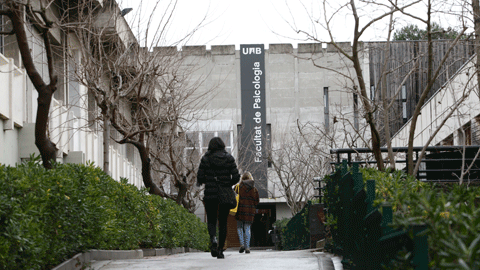Psychologists learn to care for children affected by conflicts and disasters
The Norwegian specialist Marianne Straume has conducted a seminar for members of the Barcelona Centre for Crises on the care of children and adolescents affected by conflicts and disasters. This will help the Centre to lead the way in the Spanish-speaking world in this field.

The TRT were developed by the Children and War Foundation, which includes some of the world's leading experts in the field, like Atle Dyregrov and William Yule, and they are explained in a handbook that can be used, with minimal training, by those in charge of the welfare of children and adolescents affected by conflicts and disasters: teachers, nurses, family, etc.). The aim is to provide these children with strategies to control their reactions better and to take full advantage of the support they get from their families and schools. The TRT are designed to be used from the age of 8 onwards and they work best with groups of fewer than 15 children.
The children receive 5 hour-and-a half sessions. During these sessions they are helped to cope with intrusive thoughts and feelings (mainly memories and nightmares), difficulties in relaxing, concentrating or sleeping, and triggers that bring back memories of the trauma they have lived through. They learn distraction techniques to control the intrusive images that disturb them, and learn to manage the recurring fears and dreams.
This allows them to identify their reactions and consciously relax. They are encouraged to develop their own relaxation techniques, using breathing and muscle relaxation exercises. They are also helped to organise their activities, achieve better sleep patterns and develop self-assertion. They learn to conquer their fear by controlling their painful memories and the situations that generate fear. They are also encouraged to draw, write and talk about the incidents and look to the future more than the past. As well as the sessions with the affected children and adolescents there is another one for their families and teachers.
This method can be applied to people affected by all kinds of traumatic experiences: armed conflicts, natural disasters, refugee crises, etc. It focuses on the period immediately after the impact, in the following 6 or 7 months, which is also the period prioritised by the Barcelona Centre for Crises. It is meant to be used by the children's usual caregivers, namely teachers, healthcare staff, or community leaders, rather than international experts, in line with international recommendations on psycho-social interventions. The method has been in use and evaluation since 1999 in countries like Greece, Turkey, Iran, China and Sri Lanka.
Marianne Straume works at the Senter for Krisepsykologi in Bergen, Norway, which is a point of reference for the Barcelona Centre for Crises. As an example of its work, it treated the families affected by the Utøya attack in 2011. Ms Straume herself worked with young cancer patients and their families at Haukeland Hospital before joining the Senter for Krisepsykologi, where she works on psychological follow-up after crises and serious illnesses, among others. She has also worked on UNICEF missions in Turkey and the Middle East.
The seminar was held in the Faculty of Psychology of the UAB. As well as the members of the Barcelona Centre for Crises, it was also attended by specialists from Lithuania and Bulgaria.
For now, the handbook has only been partially translated into Spanish. The Barcelona Centre for Crises will undertake to complete the translation in order to make this procedure accessible in all Spanish-speaking countries.